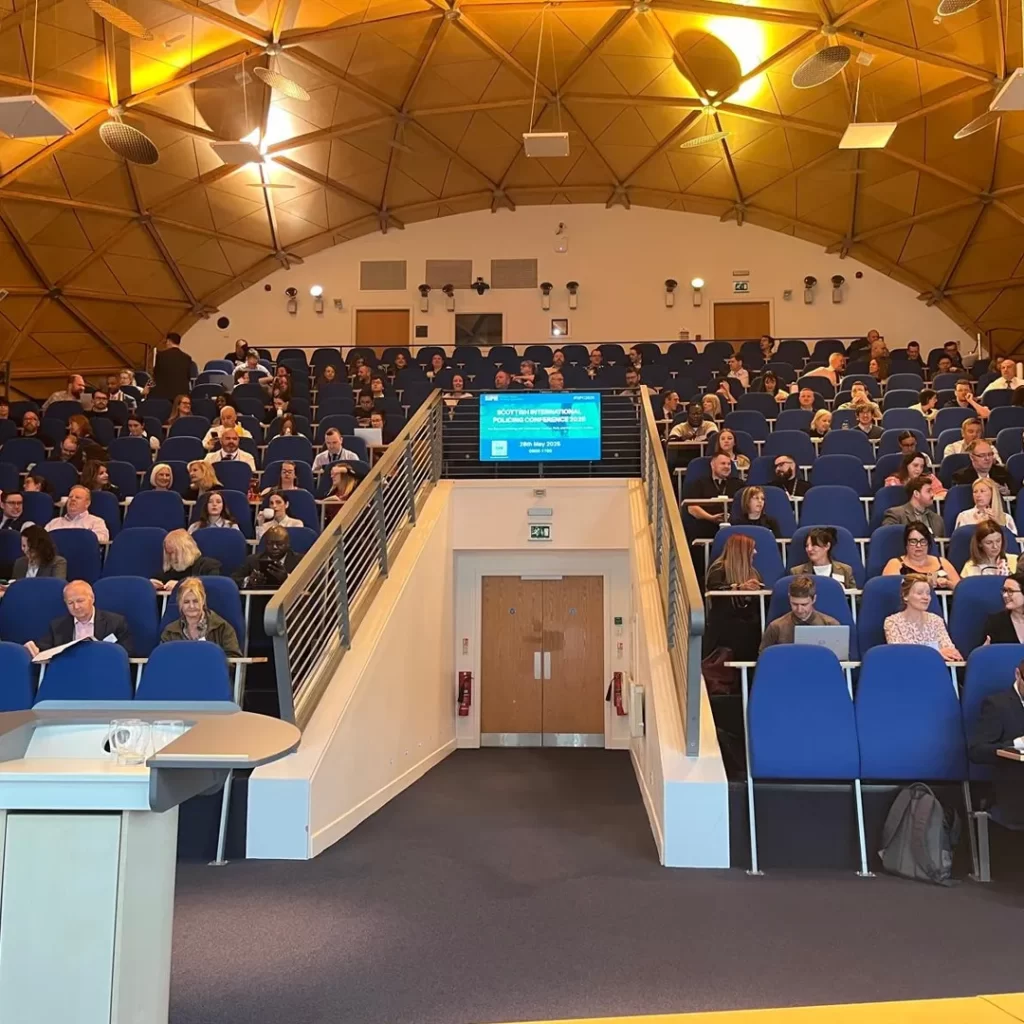

Wednesday 28th May 2025
Edinburgh Napier University, Craiglockhart Campus
Welcome to the information pages for the 12th SIPR Scottish International Policing Conference
#SIPC2025
This year the conference is being co-chaired by Dr Shane Horgan of Edinburgh Napier University and Dr Ben Collier of the University of Edinburgh and the title of this years conference is The Future of Policing and Technology; Promise, Peril, and Pathways to Justice which aligns with SIPR’s second strategic priority and covers a range of topics including artificial intelligence, surveillance, and cyber security.
As always, our aim for our conference is to provide an opportunity for valuable discussions, identifying key challenges and potential solutions, and sharing examples of best practice. We hope to provide plenty of opportunities to network, and meet your colleagues across policy, practice, and academia.
This year, the 53rd James Smart Memorial Lecture 2025 will be delivered by Special Agent Elliot Peterson of the Defence Criminal Intelligence Service and the 3rd Nick Fyfe Lecture will be delivered by Dr Lisa Sugiura, an Associate Professor in Cybercrime and Gender of the University of Portsmouth.
We look forward to welcoming you!
Further information will be posted here as the programme for the SIPC 2025 is developed.
Gender-based harms, technology, and radicalisation
Dr Lisa Sugiura, Associate Professor in Cybercrime and Gender, University of Portsmouth
Chair: Dr Andrew Wooff (Associate Director, Organisational Development Network, Scottish Institute for Policing Research)
Dr Allison Kurpiel and Dr Vicky Gorton (University of Edinburgh)
Linking data, joining forces: The promise of linked crime and health data in Scotland
Data gathered by police forms a much valued source of insight into policing and crime. However, this data provides only limited information around wider factors that may affect contact with police services and policing responses. In this talk, we present findings from the ‘Policing the Pandemic in Scotland’ study, which provided the first linked health-policing dataset in Scotland’s national safe haven. This study elicited valuable insights about the role of underlying health vulnerabilities (including mental ill health) as a potential factor in driving police enforcement during the pandemic. We then will discuss how this work is being built on following the pandemic, with the development of a project that will use linked police-health data to examine the prevalence, characteristics and healthcare pathways of people who have contact with the police as a consequence of mental distress. We reflect on the potential for further data linkage projects that could support operational policing and partnership working in Scotland.
Dr Diana Miranda (University of Stirling)
Biometric AI in policing: exploring the socio-legal and ethical landscape
This talk explores the pressing challenges emerging from the use of Biometric AI technologies in policing. By merging physical, bodily traits with machine learning algorithms, Biometric AI relies on a series of attributes that can be used as input data for AI models. These attributes can be physiological, biological or behavioural, illustrated by voice, facial features or gait. Legally defined as biometric data, these attributes can be used not only for identification purposes, but also to infer mental and emotional states and intentions (e.g. emotion recognition). Even if computing machinery impacts the use of these various attributes to identify and classify bodies, biometrics have long been used by law enforcement, long before the emergence of automated databases and digital technologies. As Biometric AI emerges in law enforcement (illustrated by the police use of live facial recognition), it is crucial to address emerging and old risks, such as the dangers of pseudoscientific assumptions and concerns over accuracy. Drawing insights from empirical research with policing practitioners, academics, and technology experts, this presentation will examine the socio-legal and ethical issues raised by Biometric AI. We will conclude with key lessons from our research, providing practical guidance on how to navigate the evolving landscape of biometric AI and its current and near future deployments.
Dr Yanna Papadodimitraki (University of Cambridge)
XP points to level-up: Gaming as a ‘gateway’ to cybercrime
Gaming is often cited as a ‘gateway’ activity to cybercrime, especially for young people. This follows the hypothesis of a linear progression from gaming to cybercrime, which is in turn influenced by the gateway drug theory. Drawing from interviews with and documentary material by law enforcement, this study explores the problematisation of gaming, the role of public perceptions and outdated research in informing policing practice. More specifically, the study looks into how gaming is thought to introduce young people, especially young men, to game modification and, subsequently, to low-level and serious cybercrime offending, and how these perceptions are inadvertently popularised in law enforcement, which can lead to the misdirection of limited police resources.
Chair: Assistant Chief Constable Stuart Houston, Police Scotland
Dr Carol Cox (Liverpool John Moores University)
An examination of the effect of using wearable technology and educational packages on health outcomes and quality of life in police officers and staff
I will present the results having just completed a longitudinal study aiming to establish whether the use of wearable technology (WT) and education packages can improve health outcomes and the quality of life of police officers/staff. WT refers to (typically) wrist-worn devices that monitor and track physiological and activity parameters during daily life. These devices may be integrated with technology in smartphones to enable features and feedback designed to improve daily living. A volunteer sample of 120 participants were randomly assigned to three groups; those who i) wore a WT device, ii) those who wore a WT device and were given an education package detailing information on health and wellbeing domains (e.g., nutrition, physical activity, sleep, stress management), and iii) a control group. Cardiovascular health checks, QoL and readiness to change questionnaires were completed pre-study, and will be repeated post-study. Results of the study indicated that wearable technology was viewed positively by most users with many making health behaviour changes. This study also linked these improvements to job performance with staff indicating more resilience, more capacity for work, greater concentration at work and more ability to handle stress. In terms of absence more than one in three stated after being part of the study they were less likely to take a day off sick leave, and 4 out of 10 stated they were less likely to leave the police service. At a time when retention is poor in the police service, the impact of this study on police officers and staff well-being is important to reflect upon and discuss.
T/Detective Superintendent Michael McCullagh (Police Scotland)
The roles and demands associated to the investigation of online child sexual abuse, and its impact on Staff. The presentation will provide an overview of the demands facing this area of policing, with a summary of the associated requirements made of police officers and police staff investigating this type of criminality with a focus on welfare impacts, staff engagement and the associated current and future wellbeing provisions available to them.
Professor Kirstie Ball (University of St. Andrews)
While surveillance is a crucial component of police work, the surveillance of police work itself has received comparatively little research attention. Yet much of front line police work is intensively surveilled: whether that be through body-worn cameras, location tracking of vehicles or call monitoring in control centres. Research in other types of workplace highlights how disproportionate monitoring can result in increased psycho-social risks for workers. This presentation sets out these research findings and considers the factors which may promote proportionate and fair work monitoring in the context of policing.
Dr Sam Curran (Scottish Police Authority: Forensic Services)
Forensic Frontline: Addressing Drug Driving in Scotland
Drug driving is a major contributor to serious and fatal collisions on Scotland’s roads. The Scottish Police Authority (SPA) Forensic Services plays a vital role in addressing this issue by providing essential testing and analysis for drug driving cases. The introduction of new legislation in October 2019, which set specific limits for certain illicit drugs, led to a significant increase in demand for drug driving analysis. This surge resulted in demand exceeding capacity, impacting both staff wellbeing and the ability to prosecute individuals suspected of driving under the influence of drugs. To address these challenges, Forensic Services are working with partners to develop a sustainable, long-term model for drug driving analysis, enabled by modern technology, ensuring we play our role in keeping Scotland’s roads safe.
Chair: Chief Superintendent Phil Davison, Police Scotland
Dr Estelle Clayton (Edinburgh Napier University)
Access denied: trust, legitimacy, and accessibility in technologically-mediated policing.
This presentation will draw on findings from the INTERACT project. Using data from interviews and focus groups with autistic individuals and BSL-using deaf individuals, this presentation will explore what accessibility looks like, and how it is experienced, in the new domain of technologically-mediated police contact. First, taking findings from interviews with the police, the presentation will explore how accessibility is defined and operationalised in policing, how accessibility has been considered by policing and technology providers, and how accessibility has been designed in to (or out of) digital decision-making. Then, drawing on findings from interviews with autistic individuals and focus groups with deaf individuals, the presentation will explore how accessibility is experienced in new forms of digitally-mediated contact, which will challenge assumptions that technology is a silver bullet that can remedy and overcome pre-existing accessibility concerns.
Professor Sofie De Kimpe (Vrije Universiteit Brussel)
Between Screen and Street: The Impact of Technology on Police Legitimacy: Insights from Participatory Observations in the Belgian Local Police
Technology has become an integral part of everyday police work. In over 90% of Belgian local police forces (Van Biervliet et al., 2024), digital tools such as Multi-Tenant Platforms (MTPs) and body-worn cameras (BWCs) are now in active use. These technologies support officers in performing their duties more efficiently—for instance, by granting real-time access to databases in the field or by recording visual evidence of interactions. Yet, they also alter something more fundamental: the nature of police–citizen interactions. As part of the DIGIPOL study, this research examines the impact of digital technology on day-to-day policing. More specifically, it investigates how technology-mediated police practices affect both police legitimacy and officer self-legitimacy. The findings reveal that technology influences not only how police officers make decisions, but also how they engage with members of the public. The study’s main conclusion is that while technology has the potential to enhance police work, it does not automatically foster greater public trust or legitimacy. Crucially, procedural justice—long recognised as the cornerstone of police legitimacy—is not always sufficiently taken into account in the implementation and use of new technologies. Digital tools can indeed support procedural justice, but they can just as easily undermine it. It is therefore essential that police officers are not only trained in how to use technology, but also supported in how to apply it in ways that reinforce transparency, fairness, and respectful treatment. Only then can technology serve as a genuine instrument for strengthening both legitimacy in the eyes of the public and the moral authority perceived by officers themselves.
Dr Shane Horgan (Edinburgh Napier University)
This presentation will discuss a small scale exploratory study which examines how frontline policing has absorbed responding to bulk-cybercrime across a range of urban, rural and suburban settings in Scotland. Drawing on data from 22 interviews with response, community, investigative and strategic officers, it will discuss how police conceive of their role in policing cybercrime, and how the limitations imposed by the online mediation of criminality leads to necessary and inevitable adaptation. Frontline policing in Scotland engages in a range of hidden labour in pursuit of justice for cybercrime victims, but in ways that are less often recognized or do not align with conventional imaginaries of ‘justice’. The presentation will conclude by reflecting on both the values and costs of local policing of bulk-cybercrime in Scotland, with an eye towards the future.
Kate Algate (VISAV, Neighbourhood Alert Project)
Embedding effective targeted community engagement, and measuring the impact on public trust and confidence across England and Wales
The Peelian Principles remain the foundation of policing by consent, shaping public trust, confidence, and legitimacy worldwide. Discover the findings from the UK’s largest public survey on policing, conducted in October 2023 and 2024 with over 135,000 responses, and be among the first to explore how the digital engagement platform Neighbourhood Alert has enhanced public perception of the police and the strategies behind this success.
Chair: Dr Niall Hamilton-Smith, University of Stirling
Gareth Hamilton (National Crime Agency)
The Basics of Cryptocurrency in Law Enforcement
Introduction/Basics:
Covering the basics of what cryptocurrency is and how it operates. This will focus on the key points of cryptocurrency to give an understanding of what it actually is and hope it works. This will not be an overwhelming deep dive into the advanced mechanics of cryptocurrency.
What to Look for:
Going over examples of what to look for when cryptocurrency is involved or what might imply cryptocurrency is involved. This will involve pointers on what to look out for when searching houses, people and phones.
Challenges of Cryptocurrency:
Discussing the various challenges and issues that cryptocurrency has brought to all types of law enforcement and all types of crime.
NCA Response:
Giving a breakdown of how the NCA is responding and dealing with the emerging and existing threats created by cryptocurrency being used by crime groups.
Dr Lynsey Shepherd (University of Abertay)
Superintendent Stevie Bertram (Police Scotland)
Adult Services Websites and their Links to Sexual Exploitation and Human Trafficking
Julia Zauner (Glasgow Caledonian University)
Addressing the Justice Gaps: Challenges and Opportunities of Reporting and Responding to Image-Based Sexual Abuse
Despite a growing body of literature, image-based sexual abuse (IBSA) remains a largely underexplored topic within academia and beyond. IBSA is an umbrella term encompassing a range of abusive behaviours including the non-consensual taking, creation, sharing, and threats to share intimate or sexual images. Whilst not a new phenomenon, the advent of the internet and rapid technological advancement have made its perpetration, and the harms caused more widespread and complex. This exploratory qualitative doctoral study, grounded in critical feminist theory, examines how IBSA is navigated and responded to within the Scottish criminal justice system. It draws on in-depth interviews with 13 victim-survivors and 9 police officers to explore the emotional, practical, and legal dimensions of reporting and navigating IBSA. The study highlights both the opportunities and persistent barriers to justice: how hopes and fears shape victim-survivors’ reporting decisions, and how evidentiary challenges constrain investigative efforts. Preliminary findings point to a significant justice gap defined by misaligned expectations, systemic limitations, and the evolving nature of digital harm. The study provides new empirical evidence and knowledge on IBSA and responses to it from the criminal justice system. Findings may serve as an invaluable resource for policy and practice, particularly the justice sector supporting the Scottish Government’s and Police Scotland’s efforts to combat gender-based violence in the digital age.
Chair: Professor Megan O’Neill (University of Dundee)
Linda McClean (Police Scotland)
Kate Wallace (Victim Support Scotland)
Alistair Henry (University of Edinburgh)
Dr Ben Collier (University of Edinburgh)
Chair: Scott Ross, Scottish Police Authority
Emily Keaney (Information Commissioner’s Office)
Data Protection as an Enabler: Police Use of FRT
The ICO is the UK’s data protection regulator. The use of FRT by police across the UK continues to expand and evolve. We recognise the benefit to policing of adopting innovative technologies such as Facial Recognition Technology (FRT) for the prevention and detection of crime. Our role is to work with organisations to understand risks, ensuring the right safeguards are adopted to avoid any unintended harm. We have renewed our focus on police use of FRT and will be publishing further details when we launch our AI and biometrics strategy later this year. Our strategy will help us to provide organisations with the clarity they need to realise the opportunities of preventing and detecting crime while protecting people from harm. We aim to empower policing in adopting technologies, whilst also ensuring that the public have confidence and trust in how these technologies are being used
Dr Ciara-Bracken Roche (Maynooth University)
The Irish case of Facial Recognition Technology
State policing agencies are often compelled by the ‘data imperative’ which makes them “believe they should be in the data collection business” (Fourcade and Hiely 2017, 16) whether data is necessary and proportionate to their goals. The widespread adoption of data collection and surveillance technologies and practices by Irish police agencies can be seen most recently in the Garda Síochána (Recording Devices) Act 2023. This talk discusses ongoing pushes by the Irish Government to introduce Facial Recognition Technology and how emergency events expedited the legislation. Concerns about information sharing and access, at a minimum, need to be in line with privacy legislation and will become more pertinent with the introduction of this latest Garda Powers bill. FRT may not do the job government is hoping it will, and is not something necessarily wanted by police on the ground, so what, on balance, is the goal of adopting this new technology?
Professor Suzanne Shale (London Policing Ethics Panel)
Humans in the loop – learning from early adoption of LFR
The London Policing Ethics Panel produced its first report on Live Facial Recognition in response to trials by the MPS in 2018. We set five conditions for its use. We recently completed a second report on LFR practice and policies, undertaken to assess whether our conditions had been met and to consider new issues arising from technological developments or policing practice over the past six years. In this presentation I shall draw on the two reports to consider the social-ethical framing of police use of LFR, focusing on how human actors conceive of LFR and its use in policing, and how police seek to generate policing benefits with this technology at their disposal. The ethical analysis will consider public perception of technology, the language used to describe it, the policing practices which surround it, and the evidence for its promised benefits.
Responding to the Global Challenge of Technology Enabled Crime
Special Agent Elliot Peterson, United States Department of Defence
Chairs: Dr Shane Horgan and Dr Ben Collier
Presented by Professor Liz Aston
Professor Liz Aston
Elliott Peterson is a Special Agent with the Defence Criminal Intelligence Service. He was formerly a Cybercrime investigator for the FBI. He is responsible for investigating complex botnets, high dollar account takeover fraud, and Distributed Denial of Service attacks. Elliott speaks and teaches extensively on investigative best practices for Cybercrime and Nation State computer intrusions. Prior to joining the FBI, Elliott worked in Higher Education and served as an officer in the United States Marine Corps. He holds a Bachelor’s Degree in Computer Science from Dickinson College and a master’s degree in Crime Analysis from Tiffin University.

I am Associate Professor in Cybercrime and Gender in the School of Criminology and Criminal Justice. I am the Chair of Hampshire Constabulary’s Force Strategic Independent Advisory Group. This is a group made up of members of the public, community groups and organisations across Hampshire, which reviews and challenges policing practices across the Constabulary – for example, Stop and Search, among others. In addition, the SIAG provides advice to the Chief Constable on controversial or complex policing issues. In this role I also sit on the Force’s Violence against Women and Girls (VAWG) Strategy Planning Group and have contributed to the National Police Chief’s Council (NPCC) Violence Against Women and Girls (VAWG) strategy. I am also a member of the Force’s Domestic Abuse Oversight and Scrutiny Panel and have sat on various Gold Groups addressing issues of sexual violence and abuse. I am a Fellow of the Institute for Research on Male Supremacism, which brings together experts from both inside and outside of academia to analyse and expose the dangers of misogynist ideology and mobilisation. I am the Deputy Director of the Cyberawareness Clinic, a project in collaboration with Hampshire Constabulary supporting the local community to become more resilient to cyberthreats and researching the types of cybercrimes experienced. I was a Strategic Themes Research and Innovation Fellow (TRIF) for the research themes of Future and Emerging Technologies and Security and Risk, developing my interdisciplinary leadership and expertise in the area of cybercrime and gender – specifically online gender abuse and technology faciliated sexual violence. Currently I am researching misogyny online and communities and movements that propogate ideological hatred against marginalised groups

Kirstie Ball is Professor in Management and co-director and founder of CRISP, the Centre for Research into Information, Surveillance and Privacy. CRISP is a joint research centre between St Andrews, Edinburgh, Stirling and Coventry Universities. Kirstie is an authority on Electronic Monitoring and Surveillance in the Workplace and has advised the European Commission, The European Parliament and the UK’s Information Commissioners Office on these matters. Over the last 25 years Kirstie’s research has been funded by UK Research and Innovation (UKRI), SSHRC (Canada), The Leverhulme Trust, The British Academy and the European Framework Programme. Kirstie also co-founded and co-edited the journal Surveillance and Society and the charitable company Surveillance Studies Network, an educational charity which supports the journal.

Michael Joined Strathclyde Police in 2003. After initial uniformed deployment in Glasgow for a number of years he joined the Criminal Investigation Department for Glasgow South. Promoted to Detective Sergeant in 2012 he returned to reactive CID policing after a short period in Force Policy and Governance and remained in this post during merger to Police Scotland where he led reactive operations into the investigation of serious crime. Promoted to inspecting rank in 2018 he diversified holding posts in Serious Organised Crime Strategy, National Disruptions Unit, Cybercrime Capability Programme and Cyber Investigations Unit overseeing investigative leadership for serious cybercrime including ransomware. In 2021 he moved back to Uniform Policing in Lanarkshire where over the next 2 years he held response and community policing roles before promotion to Detective Chief Inspector, within Technical Collections Unit, Intelligence Support, overseeing communications data, Internet Investigations Unit and online child sexual abuse intelligence development, until his recent temporary promotion to Detective Superintendent, National Intelligence Support, Local Policing. In this role he has responsibility for the management of divisional intelligence assets which support Police Commanders in ensuring the safety of communities and the associated capture and response to intelligence across local policing in Scotland.

Dr Allison Kurpiel is a post-doctoral Research fellow in Criminology based in the School of Law at the University of Edinburgh (UK). She conducts research for the Scottish Centre for Administrative Data Research with Professor Susan McVie. Her current work focuses on youth violence exposure and offending as well as police contact related to mental health distress. She received her PhD degree in criminology from the Pennsylvania State University (US) in May of 2024, where she conducted research primarily on youth victimization, school violence, discriminatory bullying, and the interplay between child welfare and juvenile justice systems involvement.
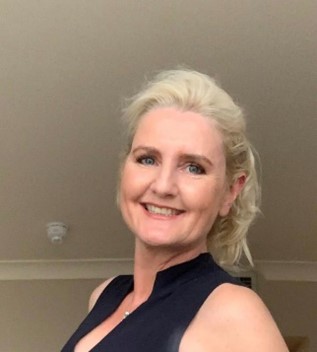
I began my career working for Merseyside Police (1994-2008), then moved into lecturing at a local university. Early on in my teaching career I developed an interest in occupational police culture and police education which formed my PhD (2016). From 2016-2018 I was successful in the role of Head/Dean for Forensic and Applied Sciences, managing staff,1500 students and a substantial budget. From 2018 to 2020 I took on the role of Head of Business and Partnership for the School of Forensic and Applied Sciences, due to my expertise and research focus of the Police Education Qualification Framework (PEQF). During that time, I developed and won tender opportunities for both Cumbria and Lancashire Police forces for the PEQF, and led other business. In the summer of 2020 I returned to my roots of Liverpool and became the Head of LCAPS, the Liverpool Centre for Advanced Policing Studies. Over the last four years I have developed new programmes for policing and won tenders around Diversity in Firearms Teams, Policing Education and Police Now; my main research focus with OSCAR KILO (The National Police Well Being Service), and police well being. Nationally, I continue to promote policing and education and have set up a National Police Research Hub across the UK, with our first conference hosted with the College of Policing in 2023. In March 2024 I won with OSCAR KILO, a large Science, Technology, Analysis and Research (STAR) bid from the Home Office for my work on the use of wearable technology for police officers and later that year we were appointed the lead university for the Executive Leadership Programme for Senior Police Leaders.

Kate Wallace has been Chief Executive Officer at Victim Support Scotland since 2017. With twenty years of extensive leadership experience in executive and non-executive positions within the public and voluntary sectors, Kate previously led Visualise Scotland—a service delivery charity supporting individuals with disabilities and complex needs. Before her tenure at Visualise, she served as the UK Programme Director for Barnardo’s.
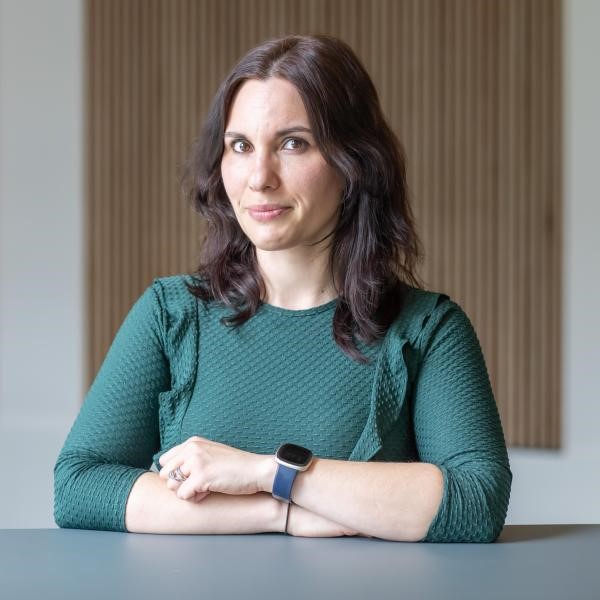
Dr Diana Miranda is a Senior Lecturer in Criminology at the University of Stirling. Her interdisciplinary research aligns criminological and sociological approaches to exploring emerging biometric, and data driven technologies. Her most recent projects range from the use of facial and emotion recognition technologies to visual surveillance tools such as body-worn video. Empirically, Dr Miranda has been engaging with law enforcement in the UK and internationally and with various expert stakeholders and citizens to understand their perspectives on the use of novel technologies. She has published over 20 articles in leading peer-reviewed journals, several book chapters, and reports.

Dr Vicky Gorton is a Lecturer in Data and Society at the Science, Technology and Innovation Studies (STIS) department at the University of Edinburgh. Vicky is an interdisciplinary researcher, with expertise in the quantitative analysis of large-scale survey and administrative datasets. She has worked on linked police and healthcare data as part of the ESRC-funded ‘Policing the Pandemic’ project. Her latest work, ‘Data Benefits’, examines the attitudes of those in receipt of benefits in Scotland towards the sharing of their data for administrative and research purposes.

Professor Suzanne Shale is an independent ethics consultant with extensive experience advising organisations in health, policing, and international development on the ethical dimensions of their work. She has chaired the London Policing Ethics Panel (an independent panel advising the Metropolitan Police Service and the Mayor’s Office for Policing and Crime) since 2017, and in that time has authored 16 reports into issues including Live Facial Recognition, Policing London’s Schools, Re-vetting processes following the conviction of Wayne Couzens, and Searches Exposing Intimate Parts by the Metropolitan Police Service. The Panel has developed an ethics matrix for assessing policing policy development. She is a member of the National Policing Ethics Committee in England. In addition to her work in policing ethics Suzanne is Vice Chair of Oxleas NHS Foundation Trust and sits on the governing body of the General Medical Council. She is a Visiting Professor at Canterbury Christchurch University.

I am an accredited Financial Investigator and fully powered Investigations Officer within the National Crime Agency (NCA). I currently specialise in borders investigations involving OCGs attempting to smuggle drugs, criminal assets and trafficked individuals into or out of the UK. I have been with the NCA for two years where I have received an extensive list of accreditations and training. Before working for the NCA I spent over a decade within the banking sector in several investigatory roles conducting various types of investigations. This is including, but not limited to, money laundering, sanctions evasion, Russian oligarchs, KYC analysis, application fraud and SAR analysis. I have conducted financial crime investigations in the banking sector in both the UK and the USA.
Yanna Papadodimitraki is a Research Associate at the Cambridge Cybercrime Centre. She is part of the Interdisciplinary Cybercrime Project (iCrime) funded by the European Research Council. She has worked in criminal justice both as a researcher and a practitioner, involved in projects on cybercrime, cybersecurity, youth offending, and offender rehabilitation.

Stevie has been a police officer for 24 years starting his career in Strathclyde Police, before transferring to Lothian and Borders and thereafter Police Scotland when it amalgamated the 8 legacy police forces in 2013. Stevie has spent the majority of his service working as a detective within the Criminal Investigation Department. In 2015 he was promoted to Detective Inspector where he was worked as Senior Investigating Officer (SIO) in several major investigations, which included one of Police Scotland’s first human trafficking investigations that led to 4 members of a serious and organised crime group being convicted. In 2017, Stevie moved from CID into a Public Protection role. In 2022, Stevie moved as Detective Chief Inspector to the Scottish Crime Campus as deputy lead for Rape and Sexual Crime, Human Trafficking and Prostitution. In May the following year, he took over as Detective Superintendent and national lead which is his current role. He has oversight of the Violence Against Women and Girls strategic plan for police Scotland.
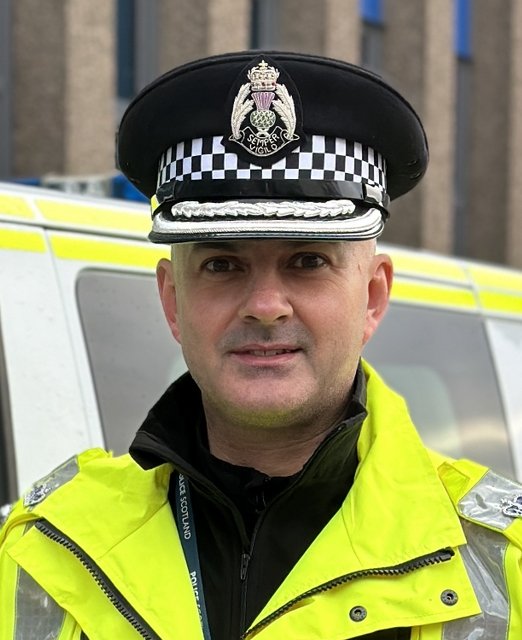
Phil has completed 26 years of service in policing, beginning his career with Fife Constabulary before transitioning to Police Scotland upon its establishment in 2013. His expertise spans operational and specialist policing, corporate services, and organisational change roles, and he has recently completed the College of Policing Executive Leadership Programme. Promoted to Chief Superintendent in 2020, Phil has provided leadership across a range of key initiatives, including delivering a new Contact Assessment Model, coordinating the local policing response to the Covid-19 pandemic including establishment of a revised operating model, and developing a National Volunteering Strategy. As Divisional Commander for Tayside from 2021 to 2024, he oversaw policing across Dundee, Angus, and Perth and Kinross, Local Authority areas. In 2024, Phil assumed leadership of a Service Delivery Review for Local Policing in Scotland and transformation efforts in modernising contact and engagement approaches. He is a Strategic Firearms and Public Order Commander, and has directed responses to major events, such as Edinburgh’s Hogmanay Celebrations and the 26th Conference of the Parties (COP26).

Julia Zauner (she/her) is a doctoral researcher and lecturer in criminology and sociology at Glasgow Caledonian University. Her doctoral research focuses on image-based sexual abuse among Scottish adults where she investigates impacts on survivors, their experiences with the criminal justice system, and their understandings of justice. In addition to her doctoral work, Julia is engaged in a research project that seeks to explore how harm is understood, prevented, and responded to within virtual communities. Her wider research interests include gender-based abuse, cybercrime, media and crime, feminist theory, and queer theory.

Sofie De Kimpe is Full Professor of Criminology at the Vrije Universiteit Brussel (VUB), where she teaches and conducts research on police organisation and policing within the CRiS research group. She holds a PhD in Criminology and has extensive expertise in ethnographic police research. Her work focuses on frontline policing, police education, profiling, and the role of technology in policing. She co-leads the CRiS research line on Policing & Surveillance and co-promotes the SRP III project Policing the Other. She also served as chair of the EU COST Action on Police Stops and is Vice-Dean of the Faculty of Law and Criminology.

Emily Keaney, Deputy Commissioner Regulatory Policy, is responsible for overseeing the ICO’s policy work programme, both domestically and internationally, as well as leadership of legislative reform and the policy profession. Emily also provides ET support and oversight for the work of the ICO’s economic analysis directorate and research function, as well as overseeing the ICO’s children’s privacy strategy. Emily has had a long career in policy, strategy and research in a wide variety of regulatory and public policy contexts, including previous roles at the UK Regulators’ Network, Ofcom and the Institute for Public Policy Research. She has a strong interest in policy, current affairs and history and when not at work can generally be found reading history books and listening to history and current affairs podcasts.

With over 15 years of experience in the policing sector, Kate takes a ‘pracademic’ approach to community engagement and policing. As a company director for the UK SME VISAV, Kate has helped expand its reach across UK policing with the Neighbourhood Alert tool. This tool aids police in improving community engagement, neighbourhood policing, problem-solving, and public trust. Kate previously served as CEO for the Neighbourhood and Home Watch Network (England & Wales) and Coventry Citizens Advice. She also worked in local government roles within community safety and children’s services. Notably, she co-wrote the chapter “From Project to Practice: Utilising Research Evidence in the Prevention of Crime” in Reducing Burglary (2018), which applied statistical insights from the Crime Survey for England and Wales to create crime prevention strategies still in use today. Kate is undertaking a part-time Master’s in Applied Criminology and Police Management at the University of Cambridge, while continuing her work with VISAV.

Dr Estelle Clayton is a Lecturer in Criminology at Edinburgh Napier University. Her work focusses on police policy and practice, neurodiversity and policing, stop and search, and police use of technology.

Assistant Chief Constable Stuart Houston is the Police Scotland executive lead for Organised Crime, Counter Terrorism and Intelligence. ACC Houston’s portfolio consists of the following business areas: Organised Crime, Counter Terrorism, Border Policing, Intelligence Support, Specialist Crime Support including International Unit, Fraud, Cyber Crime and Digital Forensics, and Covert Policing. ACC Houston was appointed to his current portfolio in February 2025, having previously been the ACC for the Professionalism and Assurance portfolio since August 2023. He has previously performed command roles within Intelligence Support and Organised Crime and Counter Terrorism Unit within Specialist Crime Division. ACC Houston joined Lothian and Borders Police in May 1996 and has undertaken a number of investigative roles across Local Policing and Specialist Crime Division.

Sam Curran was appointed as Head of Function at Forensic Services in May 2024. Previously the Policy Lead at the Scottish Police Authority, Sam had responsibility for developing and overseeing policies and programmes that promote public safety while protecting civil liberties. Prior to this, he was the Senior Manager of International Development at the Scottish Environment Protection Agency and led on the development and delivery of the agency’s first international strategy. Sam has also worked as a Strategy Consultant specialising in operational risk management and growth strategies. Sam graduated with a PhD in immunology from the University of Glasgow and a BSc in Biotechnology from the University of Edinburgh. He is also a Trustee of the charity I Am Me Scotland.

Romance fraud is a growing cybercrime that exploits human emotion, often leading to significant financial and psychological harm. This talk explores how machine learning algorithms can detect patterns of deception in online interactions, whilst serious games are used to educate and empower users to recognise and avoid scams. By combining data-driven detection with interactive prevention strategies, the research highlights an engaging approach to tackling romance scams, with the aim of reducing victimisation.

Marie Eneman is Associate Professor in Informatics at the Faculty of Science and Technology, University of Gothenburg. Her research explores the intersection of technology and law, with a particular focus on emerging surveillance practices within Swedish law enforcement, where the police serve as a key actor. She specialises in qualitative research methods and also contributes to a long-running national survey capturing public perceptions of surveillance and privacy in the digital society. Marie leads several research projects that examine: the opportunities, challenges, and dilemmas with surveillance technologies such as artificial intelligence (AI) and biometrics; how the surveillance practices are organised, governed, and regulated; how ethical and legal challenges are addressed; the implications for privacy; how surveillance data is constructed into digital evidence used in the wider Justice system, i.e from criminal investigations and prosecutions to court proceedings.
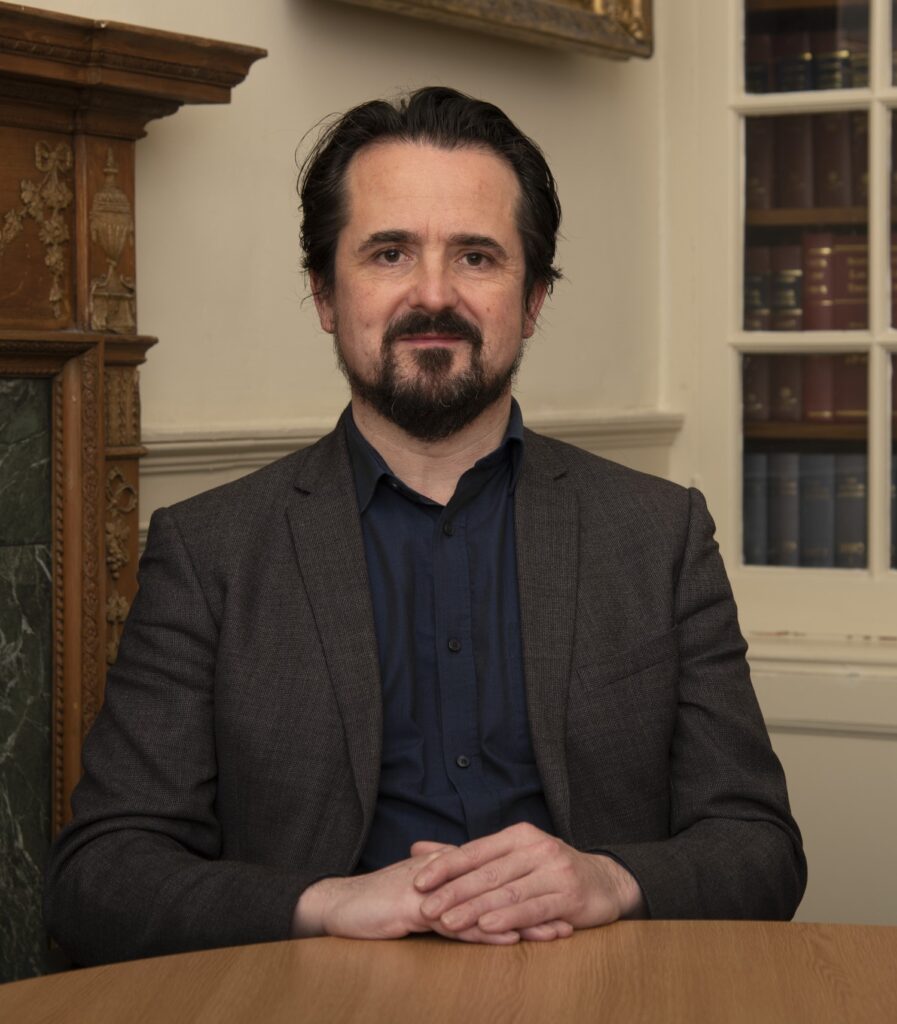
Alistair Henry is a Senior Lecturer in Criminology in Edinburgh Law School. Between 2010-2018 he acted as an Associate Director of the Scottish Institute for Policing Research (SIPR), where he chaired the Police Community Relations Network. He currently coordinates the Edinburgh/SIPR Brokering Group – connecting Edinburgh University colleagues with interests in policing..

Dr. Ciara Bracken-Roche is an Assistant Professor in the School of Law and Criminology at Maynooth University, and an Adjunct Professor in the Department of Criminology at the University of Ottawa. She completed her PhD (Queen’s University), MA (Warwick), and BSc (Toronto). Dr. Bracken-Roche sits on the Inter/national FOI Research Council of the Centre for Access to Information and Justice at the University of Winnipeg. She is also a member of the advisory board for a new publication called The Study Up, “a peer-reviewed publication featuring critical, investigative research using freedom of information (FOI) and access to information (ATI) disclosures as data.” She is also a long standing member of the Surveillance Studies Network, the International Studies Association, and WIIS-Canada. An additional line of research that bridges advocacy and academic work draws on Bracken-Roche’s background with privacy and surveillance, looking at the way privacy legislation can be mobilised for social good. This includes the Unlocking Potential Project. Ciara’s current line of research explores the adoption and use of drones and other surveillance technologies in Canada and Ireland by policing and public safety agencies. The project will create new knowledge about the relationship between police use of these technologies/techniques of governance and existing legal, social and technological norms.

Dr Shane Horgan is Program Leader for the BSc in Policing and Criminology at Edinburgh Napier University, co-lead of the SCCJR Digital Lab and sits on the SIPR Police Community Relations Network brokering team. Shane teaches on the topics of policing, cybercrime, security and criminological research methods. Over the past 10 years, his research has explored how people and organizations, both public and private, make sense of and respond to technologically enabled crime in their routine everyday lives and operations. Shane is interested in further developing criminological and sociological perspectives on cybersecurity, the policing of technology-facilitated crime and disorder, and understanding the emerging ways technology is deployed in the pursuit of security, crime prevention, and social order.

Dr Ben Collier is a Senior Lecturer in the Department of Science, Technology, and Innovation Studies at the University of Edinburgh, and the Chair of the Foundation for Information Policy Research. Ben’s work sits between Criminology and Infrastructure Studies, focusing on how emerging technologies and infrastructures become tangled up with new forms of harm – and the emerging ways that government and law enforcement are attempting to intervene.

As Head of Communications Specialist Services for Police Scotland Linda has responsibility for a team that includes Communications Strategy and Insight, Social Media, Channel Development and Graphic Design. She is responsible for setting and leading the corporate communications strategy, and communications policies as well as embedding a professional, engaging strategy and operating framework. Linda is the lead for marketing with overall responsibility for Police Scotland’s campaigns. She is also the lead for continuous improvement and continuous professional development of the Corporate Communications staff and function. Linda joined Strathclyde Police in 2009 as a Marketing Officer and has been promoted into Lead, Manager and Head roles within Corporate Communications for both Strathclyde Police and Police Scotland. Before a career in policing Linda graduated in 2002 with an honours degree in Marketing and Communication then started her Marketing career in the arts industry. She worked for a national touring orchestra and then an arts centre where her responsibilities included audience development, sales and programming. Marketing is Linda’s core skill and has been the constant in her career. Committed to her own professional development Linda is a member of the PRCA and Chartered Institute of Marketing with whom she achieved Chartered Marketer status in 2021. She has a strong interest in marketing insight and behaviour change marketing – and how this can positively impact policing outcomes. Linda is the Chair of the National Police Chiefs Council Campaigns and Marketing Professional Network.